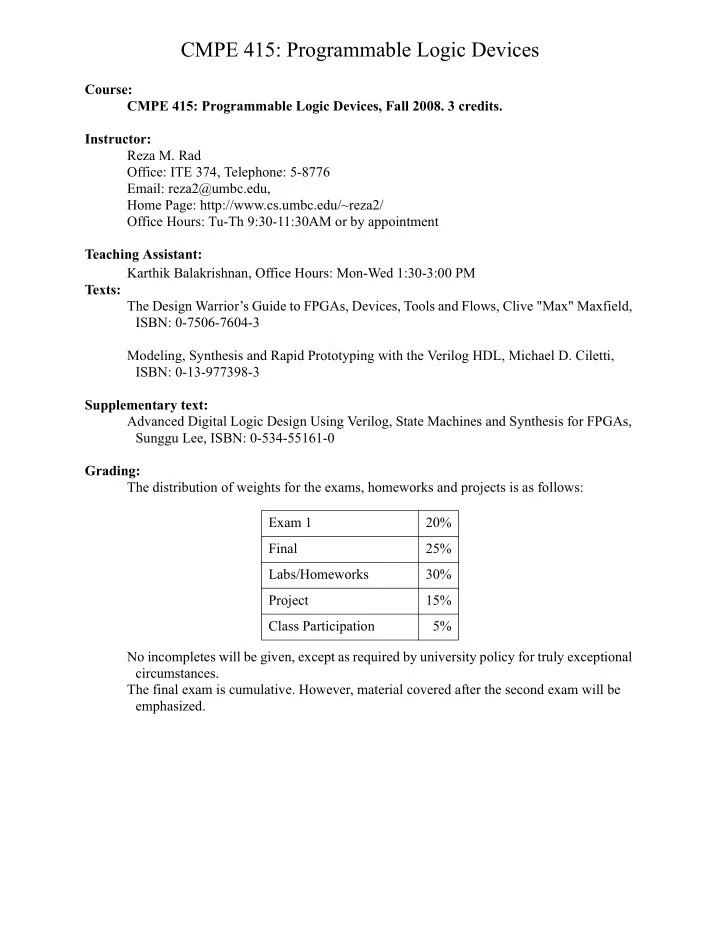

CMPE 415: Programmable Logic Devices Course: CMPE 415: Programmable Logic Devices, Fall 2008. 3 credits. Instructor: Reza M. Rad Office: ITE 374, Telephone: 5-8776 Email: reza2@umbc.edu, Home Page: http://www.cs.umbc.edu/~reza2/ Office Hours: Tu-Th 9:30-11:30AM or by appointment Teaching Assistant: Karthik Balakrishnan, Office Hours: Mon-Wed 1:30-3:00 PM Texts: The Design Warrior’s Guide to FPGAs, Devices, Tools and Flows, Clive "Max" Maxfield, ISBN: 0-7506-7604-3 Modeling, Synthesis and Rapid Prototyping with the Verilog HDL, Michael D. Ciletti, ISBN: 0-13-977398-3 Supplementary text: Advanced Digital Logic Design Using Verilog, State Machines and Synthesis for FPGAs, Sunggu Lee, ISBN: 0-534-55161-0 Grading: The distribution of weights for the exams, homeworks and projects is as follows: Exam 1 20% Final 25% Labs/Homeworks 30% Project 15% Class Participation 5% No incompletes will be given, except as required by university policy for truly exceptional circumstances. The final exam is cumulative. However, material covered after the second exam will be emphasized.
CMPE 415: Programmable Logic Devices Tentative Course Outline: Date Topic Week 1 Introduction Week 2 Introduction to Verilog Overview of Verilog Week 3 FPGA Architectures I Lab : ISE tutorial Week 4 FPGA Architectures I Lab : XESS tutorial Week 5 Verilog Data Types and Operators Lab : LAB #1 demos (Xilinx) Week 6 Verilog Event Driven Simulation, Assignment #1: Simulation Lab : LABVIEW tutorial Week 7 Verilog Behavioral Constructs Verilog State Machines Week 8 Lab : LAB #2 demos (LABVIEW), Assignment #1 due Lab: LABVIEW tutorial (cont) & Xilinx CORE generator tutorial Week 9 Verilog State Machines Synthesis of Verilog Codes, Assignment #2: Synthesis Week 10 Midterm Midterm review Week 11 Synthesis of Verilog Codes Lab : LAB #3 demos (LABVIEW&Xilinx), Assignment #2 due Week 12 FPGA Architectures II Lab : LAB #4 demos (LABVIEW&Xilinx) Project assigned Week 13 FPGA Architectures II Verilog Design Examples Week 14 Verilog Design Examples FPGA Architectures III Week 15 FPGA vs. ASIC Design Styles Schematic-based and HDL-based Design Flows Week 16 Lab: Project demos Final exam (Note: Changes/Additions to this schedule and all course related documents will be posted on the course’s Blackboard Page
CMPE 415: Programmable Logic Devices NOTE: Cheating at any time in this course will cause you to fail the course. For a complete description of academic dishonesty, refer to the UMBC Student Hand- book.The following is taken from the UMBC Student Handbook: DEFINITIONS OF ACADEMIC MISCONDUCT Academic misconduct may include but is not limited to the following: Cheating: knowingly using or attempting to use unauthorized material, information, or study aids in any academic exercise. Fabrication: Intentional and unauthorized falsification or invention of any information or citation in an academic exercise. Facilitating Academic Dishonesty: Intentionally or knowingly helping or attempting to help another commit an act of academic dishonesty. Plagiarism: Knowingly representing the words or ideas of another as one’s own in any academic exercise, including works of art and computer-generated information/images. POLICY FOR RESOLVING CASES OF ACADEMIC MISCONDUCT Individual faculty members have the right and responsibility to deal directly with any cases of academic misconduct which arise in their courses. Instances of academic misconduct may be identified in one of two ways. If a faculty member believes a student has committed an act of aca- demic misconduct--for example, by direct observation of student behavior, by comparing the con- tents of an assignment with that submitted by another student, or by reviewing notated sources or references--the faculty member, in consultation with the Chair of the Academic Conduct Commit- tee, will assess the student’s alleged misconduct and the faculty member’s options. If a student believes that academic misconduct has occurred, the student will notify either the faculty member or the Chair of the Academic Conduct Committee. It is particularly important that the Chair of the Academic Conduct Committee be consulted. The Chair can provide knowledge and insight for the faculty member. Communication of instances of academic misconduct also protects the integrity of the university by providing a means of recording infractions that may be repeated by a particular student, or which may prove endemic to a particular course or department. Consultation with the Chair of the Academic Con- duct Committee provides a formal record of the infraction and resolution, protecting the student, professor, and university should any questions later arise. The student will have the opportunity to respond to an accusation of academic misconduct.
Recommend
More recommend